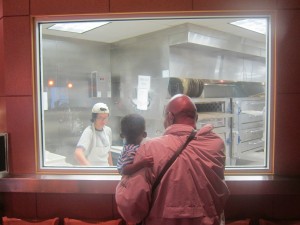One advantage of having a young child to raise, as a linguist, is the chance to use them as human study materials for language acquisition. It’s so cool I don’t know why I never thought of it before.
 In any case, already a little sensitive to the intrusion of English into that early education space that I (and a majority of researchers) believe should be meant for the mother tongue, I’m pleasantly surprised that all of my son’s first words are – so far – in Yorùbá. At eighteen months and a few weeks, we’re now able to recognise “gbà” (take), and “bàbá” (father) out of hundreds of other yet incomprehensible syllables. He, of course, also says “bye-bye”, an English expression, with his wrist flailing up and down in a goodbye wave. The linguistic explanation for his easy acquisition of bilabial plosives first isn’t far-fetched.
In any case, already a little sensitive to the intrusion of English into that early education space that I (and a majority of researchers) believe should be meant for the mother tongue, I’m pleasantly surprised that all of my son’s first words are – so far – in Yorùbá. At eighteen months and a few weeks, we’re now able to recognise “gbà” (take), and “bàbá” (father) out of hundreds of other yet incomprehensible syllables. He, of course, also says “bye-bye”, an English expression, with his wrist flailing up and down in a goodbye wave. The linguistic explanation for his easy acquisition of bilabial plosives first isn’t far-fetched.
However, from the time he was able to listen to instructions, I’d made a habit of regularly prodding him to pronounce those common Yorùbá words. Bàbá (father), Màmá (mother), “gbà (here, have), “wá” (come here), wo (look!), maabọ̀, etc. So far, he hasn’t mastered them all, but he knows what they mean and how they are used. And now, he can already pronounce a few of them. He can also understand equally accessible English words like “no” and “come” and “mummy”, which is helpful, since his mother speaks predominantly in English.
What I’ve come to discover in the end is that this bilingual upbringing will likely follow a similar path as monolingual one as far as the acquisition of complex terms are concerned. No matter what language the child learns first, won’t he still learn the easy, monosyllables first, and then others? And if that’s the case, why not just open him up to as many languages are possible? In any case, pure monolingualism is, these days, likely an impossible eventuality. Not in Nigeria anyway.
Maybe I have a theory here somewhere. In any case, there is hope.
_____
PS: I’m currently editing Ake Review 2015 – the literary publication of the Ake Festival 2015. If I’m not on this blog as regularly as I’ve always been, this is why. If you are in this area, you should come to Abeokuta in November for a gathering of writers from across the world.
I’m also working on my TED talk meant for delivery at TEDxIfe event in November. It’s a talk I’m tailoring towards this issue of bilingualism, particularly the destructive nature of our current educational policies. I’m currently in-between getting together a sunny speech to convey what is actually the gloom I feel. Not an easy balance.
Also, school has resumed, so plenty busy days lie ahead.
No Comments to On His First (Bilingual) Words so far. (RSS Feeds for comments in this post)